Frances di Plino's Blog, page 11
July 4, 2013
Ten facts about … Catriona King
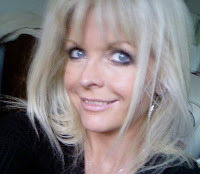 When did you first realise you wanted to be a writer?I’ve written in some form since I was a child, whether for work or pleasure. The first time I realised that I wanted to try to be published was in 2010. That was when I started to write the D.C.I. Craig thriller series
When did you first realise you wanted to be a writer?I’ve written in some form since I was a child, whether for work or pleasure. The first time I realised that I wanted to try to be published was in 2010. That was when I started to write the D.C.I. Craig thriller seriesHow long does it take you to write a book?That’s an interesting and difficult question. It really depends on whatever else is going on in my life. If I have time then I can write the first draft of a novel in somewhere between eight to ten weeks. Editing could take another month. If I don’t have time it could take forever! I find writing sequels easier than writing new novels with completely new characters.
What is your work schedule like when you're writing?I start writing in the morning as soon as I wake up. That could be anywhere between 6am and 8am, depending on the day’s schedule. Then I write; until lunchtime on a bad day and around five o’clock on a good one. I tend to think it terms of how many words I’ve written that day rather than the hours –on a good day the words come easily, or a bad day it’s like pulling teeth. I know when I need to stop writing in a particular day because the typos start piling up!
How many crime novels have you written?I’ve written four novels in the D.C.I. Craig series and I’m writing a fifth novel in a completely new vein at the moment. The new one is a spy/ espionage thriller, set in New York, rather than a crime novel.
Which is your favourite and why?
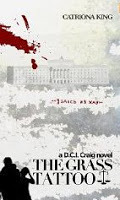 I really like book two in the D.C.I. Craig series
The Grass Tattoo
because of the Russian Mafia characters. The Russian mafia are fairly secretive so research was a challenge.
I really like book two in the D.C.I. Craig series
The Grass Tattoo
because of the Russian Mafia characters. The Russian mafia are fairly secretive so research was a challenge.Where do you get your ideas?From anything and everything I see. I can be sitting in a café when a random idea will occur to me and I’ll jot things down. I have notebooks full of them which I forget about and then discover. But my handwriting is dreadful so I often can’t work out what I’ve written!
Who is your favourite character from your own work and why?I like the lead character Marc Craig. I think if I were a man I would be like him. And the second lead Liam Cullen, because he’s so politically incorrect and (hopefully) funny.
Which character from the work of others do you wish you’d invented and why?Doctor Who without question. Given that you can be anywhere in time and space, the potential story lines are limitless.
If you could have been someone from history involved in crime (good or bad) who would that be and why?Sherlock Holmes. He was so eccentric and so brilliant.
What are you working on now?A new stand-alone thriller set in New York. It’s called The Carbon Trail and is about love, espionage and science!
BiographyCatriona King trained as a doctor, and as a police Forensic Medical examiner in London where she worked for many years. She worked closely with the Metropolitan Police on many occasions. In recent years, she has returned to live in Belfast. She has written since childhood, fiction, fact and reporting.
Twitter https://twitter.com/CatrionaKing1Facebook https://www.facebook.com/catriona.king.90
Published worksD.C.I. Craig Belfast's Modern Thriller Series
 A Limited Justice
The Grass Tattoo
The Visitor
The Waiting Room
A Limited Justice
The Grass Tattoo
The Visitor
The Waiting Room
Published on July 04, 2013 02:35
June 30, 2013
Publisher's Three Day Sale
My publisher, Crooked Cat Publishing, is having a three day sale on their e-book titles and Bad Moon Rising is available at 77p/99c (usually £2.77).
http://www.amazon.com/Bad-Moon-Rising-ebook/dp/B007HH5H8O
http://www.amazon.co.uk/Bad-Moon-Rising-ebook/dp/B007HH5H8O
Sale ends at midnight on Tuesday July 2nd.
http://www.amazon.com/Bad-Moon-Rising-ebook/dp/B007HH5H8O
http://www.amazon.co.uk/Bad-Moon-Rising-ebook/dp/B007HH5H8O
Sale ends at midnight on Tuesday July 2nd.
Published on June 30, 2013 00:56
June 27, 2013
Ten facts about … Mel Sherratt
When did you first realise you wanted to be a writer?
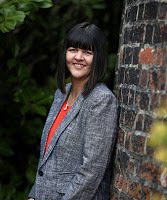 I can’t remember a time when I didn’t want to be a writer. I’ve always had a love of words since I was a little girl - a long, long time ago.
I can’t remember a time when I didn’t want to be a writer. I’ve always had a love of words since I was a little girl - a long, long time ago. How long does it take you to write a book?About four - six months. I do three, sometimes four drafts before I’m happy enough to show it to anyone for feedback.
What is your work schedule like when you're writing?When I am drafting or rewriting a book, most days I start each morning by writing 2,000 words. I have to do it first thing or else the whole day can go by and then I just do anything like answer emails, set up an author interview on my blog, revamp my website etc. It all needs doing but not straight away. So I try to do as much as I can before breakfast. That way I’m more likely to continue - it’s like fooling the mind, I suppose, to get more done.
But often, like yesterday, I couldn’t settle until I had done all the other jobs so I didn’t sit down to write until the afternoon. I think this is when my mind is busy working on a scene that isn’t ready to spill out - well, it works for me.
When I’m just starting a project, it can take ages for me to get going but I make up for it at the end when the words come so fast I can’t keep up. So if I’ve done 3000 a day by some means, I’m happy with that. And yes, it might sound like a lot but it is my day job and also I do very dirty first drafts so I just get the words down and edit like crazy after.
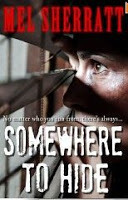 How many crime novels have you written?Five - Three in The Estate Series, one standalone police procedural and one psychological thriller.
How many crime novels have you written?Five - Three in The Estate Series, one standalone police procedural and one psychological thriller. Which is your favourite and why?Without a doubt, the last one I wrote, Watching Over You is my favourite. I was able to explore a character breaking down through the traumas of her life catching up on her. I exercised her dark side - she’s a sex addict, craving the rejection it brings as well as the attention. I chose two women characters because I wanted to create a sense of one woman falling in love again after losing her husband in a tragic accident and the other falling apart because she fell in love with her too.
Where do you get your ideas?Everywhere. It’s just a snippet I’ll hear, or a photo I’ll see; a news bulletin that sparks off a chain of thoughts. I have an idea for book four, The Estate series because I heard the title as a song lyric. I think I’m a born dreamer.
Who is your favourite character from your own work and why?Again this would have to be a character from my new book, out in January next year, Watching Over You. Ella was the character that broke down - by doing this she enabled me to take her on a journey where she absolutely terrified my editor and agent but they felt such empathy for her too. Ella isn’t afraid to do anything - neither am I, in my writing. Recently, I did a talk at a local writers’ group and a lady said to me, ‘the thing I like about you is that you’re not afraid to write about anything.’ It was such a compliment. My books are shocking but realistic.
Which character from the work of others do you wish you’d invented and why?For me, that would have to be Bridget Jones. For years before Helen Fielding created her, I had an idea (I bet a lot of writers out there did too) to do the same thing - a diary of a single woman trying to find love. I just loved her - and she swore too! I’m a bit of a potty mouth in my books.
If you could have been someone from history involved in crime (good or bad) who would that be and why?Hmm…does 1973 count? Because if so I’d like to be PC Annie Cartwright (Liz White) in Life on Mars- because she gets to kiss Sam Tyler (John Simms)…
What are you working on now?Because I’ve just got a traditional book deal which means that Taunting the Dead, my first novel, is going to be repackaged and published in UK, US and Germany in December this year, I’ve decided to write another book featuring the main character, Allie Shenton. It’s something I always intended on doing but as The Estate series took off, I didn’t think about it too much. Now I’m 25k into the first draft and absolutely loving it. Well, as much as you can love first drafts - I do find them quite painful to write!
Author bio:Ever since she can remember, Mel Sherratt has been a meddler of words. Right from those early childhood scribbles, when she won her first and only writing competition at the age of 11, she was rarely without a pen in her hand, or her nose in a book. Born and raised in Stoke on Trent, Staffordshire, Mel used her own city as a backdrop for her first novel, Taunting the Dead, and it went on to be a Kindle #1 bestseller in three different categories and a top 10 bestselling Kindle KDP book 2012 on Amazon.co.uk. She has also self-published three books in The Estate series. Determined never to give up on her dream of a traditional deal, Mel has recently signed a two book deal with Thomas and Mercer.
Website http://writerofmurderandmayhem.wordpress.com/
Twitter @writermelshttps://twitter.com/writermels
Facebook http://www.facebook.com/pages/Mel-Sherratt/218120504951096
Titles TAUNTING THE DEADSOMEWHERE TO HIDEBEHIND A CLOSED DOORFIGHTING FOR SURVIVALWATCHING OVER YOU (out Jan 2014)
Published on June 27, 2013 06:15
June 23, 2013
Ten facts about … Barbara Scott-Emmett
When did you first realise you wanted to be a writer?
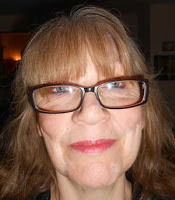 I can remember making little books out of folded paper for my stories when I was fairly young. I can also remember being told off at school for writing compositions so long and involved that the teacher gave up reading half way through. Yes, Mrs Edgecombe, I’ve never forgiven you for that! So, I suppose it’s always been in me though it took a long time for me to get started properly.
I can remember making little books out of folded paper for my stories when I was fairly young. I can also remember being told off at school for writing compositions so long and involved that the teacher gave up reading half way through. Yes, Mrs Edgecombe, I’ve never forgiven you for that! So, I suppose it’s always been in me though it took a long time for me to get started properly.How long does it take you to write a book?Years and years usually. I think the shortest time has been two years and the longest seven or eight years. I really do need to speed up though, as I’m no longer in what could be called the first flush of youth (or even the second).
What is your work schedule like when you're writing?If it’s going well I’ll probably start writing sometime in the morning and continue until I run out of ideas. This can be after 1,000 to 2,000 words when I’m really in the flow. Other times I might only manage 500 words before I concede defeat. Then I’ll usually turn to editing something completely different, or look over previously written chapters of whatever it is I’m working on. If I’ve had enough of sitting at my desk I’ll go for a swim or a walk or, if I can’t put it off any longer, get the dishes washed and the floor vacuumed.
How many crime novels have you written?I’ve only completed one crime novel – Don’t Look Down – but I’ve started two others. One of these reinvented itself half way through and decided to become a non-crime novel. I rewrote this as Delirium, which I’ve recently finished. The other part-done one is hiding somewhere on my computer and I hope to track it down one day and finish it off. I also have an idea for a series featuring an elderly woman and her granddaughter as amateur sleuths.
Which is your favourite and why?
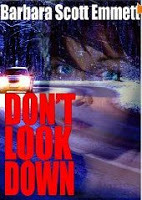 Since
Don’t Look Down
is the only one I’ve finished, I suppose I’ll have to nominate that. I am fond of it anyway because it’s set in Nuremberg, Germany, which is a wonderful mediaeval town that I’ve long considered as almost my second home. Where do you get your ideas?The idea for
Don’t Look Down
came to me after a visit to Nuremberg to see some friends. I’d been many times before but this was the first time I’d visited in winter and I fell in love with the town and the surrounding countryside all over again and had to use it as a setting.
Since
Don’t Look Down
is the only one I’ve finished, I suppose I’ll have to nominate that. I am fond of it anyway because it’s set in Nuremberg, Germany, which is a wonderful mediaeval town that I’ve long considered as almost my second home. Where do you get your ideas?The idea for
Don’t Look Down
came to me after a visit to Nuremberg to see some friends. I’d been many times before but this was the first time I’d visited in winter and I fell in love with the town and the surrounding countryside all over again and had to use it as a setting.Who is your favourite character from your own work and why?My favourite character in Don’t Look Down is a minor character called Axel. He’s mysterious and hypnotic and is actually loosely based on someone I once knew in Nuremberg. I expect if I met the real version again now, I’d be most disappointed.
Which character from the work of others do you wish you’d invented and why?Giles Brandreth writes crime novels starring Oscar Wilde as an amateur investigator. Initially, I thought this was a bizarre concept but I just wish I’d had the idea first as it’s right up my street. I expect poor Oscar is rolling about in his grave at having been used as a fictional detective though – as if the indignities of his life weren’t enough!If you could have been someone from history involved in crime (good or bad) who would that be and why?I once played Dr Crippen’s wife, Belle Elmore, in an amdram theatre production and have been interested in the case ever since. After murdering her, Crippen and his lover, Ethel le Neve, fled to Canada by ship but were recognised by the captain. The recent invention of the radio telegraph meant he was able to inform Scotland Yard of their presence aboard. Inspector Dew of the Yard got a faster passage to Quebec and arrested the pair as they came ashore—the very first instance of a criminal being captured because of ship to shore communication. I’d like to have been Inspector Dew—that must have been a very satisfying moment.
What are you working on now?I’m having a short break from new writing as I’ve recently finished Delirium which was a long haul project. I still have tweaks to make to that book, and am also lightly rewriting a previously published non-crime book The Man with the Horn, in order to bring it out as an ebook. I have an idea for a new book based on the discovery of a mysterious dead man on a beach in Australia that I might pursue, or I may start on that series with the grandmother and granddaughter I mentioned earlier. I’m eager to get started on something soon and hopefully this time it won’t take me several years to complete.
Bio:Barbara Scott-Emmett lives in Newcastle and writes in a room overlooking the Tyne – a greener view now than in the old industrial days. She shares this writing space with her husband, crime novelist Jimmy Bain, and their cat Gizzie—who has first pick of the available chairs. When not writing she edits the work of others and assists in ebook creation.
Published work:Don’t Look Down The Land Beyond Goodbye The Man with the Horn currently paperback only – ebook coming soonDrowningWasps & Scorpions: Luv Pomes & Other LiesAmazon Author Page SmashwordsPentalpha Publishing Edinburgh
Website: http://www.emmettweb.co.uk/bse/index.htmlBlog: http://barbarascottemmett.blogspot.co.uk/Facebook: https://www.facebook.com/barbarascottemmett.writerTwitter @BSE_Writer
Published on June 23, 2013 06:43
June 13, 2013
Ten facts about … JJ Marsh
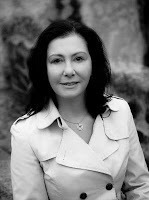 When did you first realise you wanted to be a writer? I wanted to tell stories as soon as I was capable of sentient expression. Actually, even before sentient expression. My mum recalls me burbling on in my pram, talking to trees, cows and knitted rabbits. As a child, I used to direct performances starring my cousins; as a teenager, I wrote songs and poetry – thankfully all destroyed in the Great Abergavenny Earthquake. As an adult, I acted, directed and told lies (see previous sentence). Finally, I found an outlet for all those urges – writing.
When did you first realise you wanted to be a writer? I wanted to tell stories as soon as I was capable of sentient expression. Actually, even before sentient expression. My mum recalls me burbling on in my pram, talking to trees, cows and knitted rabbits. As a child, I used to direct performances starring my cousins; as a teenager, I wrote songs and poetry – thankfully all destroyed in the Great Abergavenny Earthquake. As an adult, I acted, directed and told lies (see previous sentence). Finally, I found an outlet for all those urges – writing.How long does it take you to write a book?I’m getting quicker. The first two (consigned to a drawer until the next earthquake) took about five years. Now I have learnt a bit about writing, created Beatrice Stubbs and understand (some of) my weaknesses. I can usually produce something halfway decent in eighteen months.
What is your work schedule like when you're writing?I would love a work schedule. In fact, a work schedule is on my Christmas list. My freelance, unpredictable, stumble-trip-hiccup, overloaded and frankly messy lifestyle tends to sabotage all attempts at organisation. I write in big fat emergency chunks when I can – on the train, in the dentist’s waiting room and in those precious moments when the pugs are asleep. And on Sunday mornings, when housework is forbidden in Switzerland.
How many crime novels have you written?Three. And three more to come. But then I’m done.
Which is your favourite and why?The next one, because I’m not yet bored of it.
Where do you get your ideas?In no particular order: dreams, Grazia magazine, intangible atmosphere, three blokes in a Bristol Post Office, deepest fears, London Review of Books, reflections in a puddle, Brecon High School’s library, overheard conversations, Aphex Twin, the personality of a city, Eddie Izzard, past conditionals, John Knapp Fisher, long journeys, and Celtic gravestones.
Who is your favourite character from your own work and why?
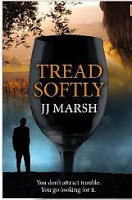 Beatrice Stubbs. Her basic insecurity and accidental successes are balanced by a professional, dogged determination. And I love the way she interacts with her sidekicks. She’s a mixture of Columbo and Hong Kong Phooey in a Marks and Spencer twinset.
Beatrice Stubbs. Her basic insecurity and accidental successes are balanced by a professional, dogged determination. And I love the way she interacts with her sidekicks. She’s a mixture of Columbo and Hong Kong Phooey in a Marks and Spencer twinset.Which character from the work of others do you wish you’d invented and why?Clarice Starling in The Silence of the Lambs. Of course Hannibal Lecter is one of the best bad guys ever written. But the intellect to challenge such a man? Clarice; the grafter, the grubber, the winner is an absolute classic.
If you could have been someone from history involved in crime (good or bad) who would that be and why?Rather than an individual, I’m going to say Social Services. These people have a deeply traumatic, upsetting and stressful job; braving ugly and dangerous situations, trying to protect the most vulnerable, while hamstrung by bureaucracy and politics. They are real heroes, working at the unglamorous end of crime and catching the balls society drops. Sadly, the only publicity they ever get is for the few they miss.
What are you working on now? Book Four – Cold Pressed. Shocking murders, beautiful scenery, long-buried secrets and Beatrice Stubbs faces the toughest test of her life. Currently in research mode – Greek figs, feta and flaming Sambuca. Out in 2014, if I ever finish the research.
Jill grew up in Wales, Africa and the Middle East, where her curiosity for culture took root and triggered an urge to write. After graduating in English Literature and Theatre Studies, she worked as an actor, teacher, writer, director, editor, journalist and cultural trainer all over Europe.
Now based in Switzerland, Jill works as a language trainer, forms part of the Nuance Words project and is a regular columnist for Words with JAM magazine. She lives with her husband and three dogs, and in an attic overlooking a cemetery, she writes.
http://www.beatrice-stubbs.com/Beatrice is on FacebookJJ Marsh on Amazon
Twitter: @JJMarsh1
Published WorksBehind Closed Doors Raw MaterialTread Softly
Published on June 13, 2013 04:06
June 9, 2013
Review of To Kill a Stranger
To Kill a Strangeris Jack Devon’s debut. However, judging by the ending, this is intended to be the first in a series about Harry Sterling, former soldier and killer with a conscience.
Whilst at rock bottom and sleeping rough, a former comrade in arms offers Harry the chance to rebuild his life. Taken into the shadowy world of contract killing, Harry is given a number of targets to remove with no questions asked and massive rewards for jobs well done.
Harry is more than ready for the challenge, until he has to pull the trigger in cold blood and finds he can’t do it. This leads him into a world of deception that turns hunter into hunted.
The author’s bio states he is a former British intelligence agent and Reuters correspondent who has lived and worked in 40 countries and covered a dozen wars. This insider knowledge is evident in the settings and the ease with which he brings war scenes and casual violence to the page.
In places the plot stretches credulity, but in any book of this type it is necessary for readers to suspend disbelief. The storyline fairly raced along and kept me turning the pages. I hope there is a sequel as I’d like to see how Harry develops.
Published on June 09, 2013 22:42
June 6, 2013
Ten facts about … Rachel Abbott
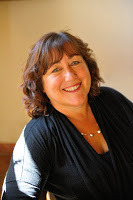 When did you first realise you wanted to be a writer?I have always been a writer of sorts – from my days at school when I loved to write essays, to my business life when I wrote scripts for training and education programmes, creative proposals to potential clients and storyboards for interactive software. At the back of my mind was the idea that I would like to write a novel, but the first time that I ever said the words out loud was in 1994. Even then I had the idea for Only the Innocent, and it was just bursting to get out. It took another 15 years before I actually had the time to write (I ran my own company, so a seventy hour week was the norm) – and now I’ve started writing, I can’t stop!
When did you first realise you wanted to be a writer?I have always been a writer of sorts – from my days at school when I loved to write essays, to my business life when I wrote scripts for training and education programmes, creative proposals to potential clients and storyboards for interactive software. At the back of my mind was the idea that I would like to write a novel, but the first time that I ever said the words out loud was in 1994. Even then I had the idea for Only the Innocent, and it was just bursting to get out. It took another 15 years before I actually had the time to write (I ran my own company, so a seventy hour week was the norm) – and now I’ve started writing, I can’t stop!How long does it take you to write a book?That’s a difficult question, because I spend a lot of time planning. I need to know my characters intimately. I need to consider where they would live, how they would furnish their homes, what they like to eat and drink – the smallest details that make these people real to me. Initially I come up with an idea, which ferments for a while – usually while I am editing the current book. Once I have the idea, I have to think about the people that would make this idea work, and fill in all the details about them. Then I plan the whole thing. I don’t always stick to the plan, but having it there gives me a direction.
The physical writing probably only takes about three months, but then I edit, my agent edits, my editor edits and that process takes quite a while too. So the total process is probably about nine months.
What is your work schedule like when you're writing?I try to get up at 7 each morning, so that I have time to answer emails, chat to people on Twitter, etc. By the time I’m ready to write, it’s probably about 9 am. I work until 1 and then stop for half an hour for some lunch. Then start again. Depending on how it’s going, I might write until 6 or 7, and then I look at emails and see if there is anything else that I need to respond to. I do that basically seven days a week, unless my husband drags me out for a walk because he’s really concerned that I have become surgically attached to my chair.
How many crime novels have you written?
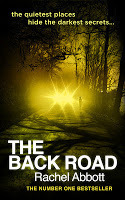 I’ve competed two – Only the Innocent and The Back Road – and the third is under way.
I’ve competed two – Only the Innocent and The Back Road – and the third is under way.Which is your favourite and why?It is – and it will always be – the next one that I write! Like most writers, I guess I am very self-critical. I can see things that maybe I should have done better, and resolve to learn and improve for the next one. I love the story for my next book, and I hope that the lessons I have learned about writing will all come through, making it the best ever. Until the one after, that is.
Where do you get your ideas?From people. Not that I personally know many murderers – but the victims in my stories are not necessarily the ones who get killed.
In Only the Innocent, I remember seeing a programme about women murderers on the television. Accepting that some women murderers are clearly deranged, it was also clear from this programme that some seemed like normal, ordinary women. So I had to ask myself – what would make a sane woman commit a cold-blooded murder? What set of circumstances could be so bad that she had no other choice? Then I worked out what sort of woman this might be and why she couldn’t have done anything else.
With The Back Road, I wanted to think about a group of average people, with average deceptions in their lives. I wondered what would happen if a tragic event acted as some sort of catalyst, which exploded in their midst and exposed all their secrets and lies.
Who is your favourite character from your own work and why?Leo (Leonora) Harris, from The Back Road. When I created Leo’s character, she was quite cynical and cold. But as the story developed and I edited her scenes, I stopped seeing her as the person on my character sheet and started seeing her through the eyes of other people in the story. This changed the way she interacted with people – especially Tom Douglas, the neighbour and policeman. I like the way that she cuts through any niceties and gets straight to the point. She’s also quite damaged, and she’s going to appear in future books as maybe the hard carapace falls away bit by bit.
Which character from the work of others do you wish you’d invented and why?The honest answer might surprise you – but that would by Harry Potter. NOT for the money (although that would be very nice, of course) but because I salute JK Rowling for her staggering imagination. It’s the bits like the train station, and the game of Quiddich – I can’t begin to imagine a mind that sets itself free enough to think of such things. And the books were so clever – they may be aimed at children, but the writing was so well done that it amused adults too. The idea of Dumbledore liking knitting patterns is a classic example.
So – it might be a strange choice for a thriller writer, but I admire anybody who has such a vivid imagination and sense of humour.
If you could have been someone from history involved in crime (good or bad) who would that be and why?I would really like to have committed the perfect heist. No weapons allowed – nobody gets hurt – and I would happily give the diamonds or whatever away. But again it’s that level of ingenuity and clever thinking that I love. I read a story about a spectacular diamond heist in Berlin. There were three men, and I believe they came in through the roof – a bit like a Mission Impossible scenario. However, they made one mistake. The dropped a glove. There was DNA on the glove – but because two of the perpetrators were identical twins, with identical DNA – neither of them could be prosecuted.
Whenever I see a film about a heist, I always want the perpetrators to get away!
What are you working on now?I’m working on my third novel. I am really excited about the story, but as always before I can start writing, I need to get all the preparation work done. I’ve done the key character profiles, the story timeline and identified some of the locations. I’ve also sketched the overview of the story – so I’m ready to get all the pieces in place. But until I know these locations and characters like I know my own home and my husband’s face – I’m not quite ready to start to transfer these to my story. If I don’t know what these people look like, how can I describe them to my readers?
The real writing will start, hopefully, in about two weeks’ time.
Links:
Rachel Abbott website: http://www.rachel-abbott.comRachel Abbott blog : http://rachelabbottwriter.wordpress.comRachel Abbott media site: http://www.rachel-abbott.info Twitter account #1: https://twitter.com/_RachelAbbottTwitter account #2: https://twitter.com/Rachel__AbbottFacebook: www.facebook.com/rachelabbott1writer
Only the Innocent Amazon UK Only the Innocent Amazon USThe Back Road Amazon UK
For purchases for e-readers other than Kindle, please consult the Rachel Abbott website.
BiographyRachel Abbott was born just outside Manchester, England. She spent most of her working life as the Managing Director of an interactive media company, developing software and websites for the education market. The sale of that business enabled her to fulfil one of her lifelong ambitions - to buy and restore a property in Italy.
Rachel lives part of each year in the completed property with her husband and two dogs, and the rest of the year at their home in Alderney – one of the Channel Islands - where she is now able to devote time to her other passion - writing fiction.
Published on June 06, 2013 01:19
May 29, 2013
Ten facts about … Gillian Hamer
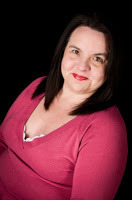 When did you first realise you wanted to be a writer?I’m not totally sure it was ever a premeditated decision. I was good at English at school and had an excellent English teacher in junior school who got me interested in books. I loved our village library – started with Enid Blyton and soon moved onto Agatha Christie. I think writing was a natural progression of reading for me – wanting to create my own stories and realising I was quite good at it and it wasn’t something everyone else could do as easily as I could!
When did you first realise you wanted to be a writer?I’m not totally sure it was ever a premeditated decision. I was good at English at school and had an excellent English teacher in junior school who got me interested in books. I loved our village library – started with Enid Blyton and soon moved onto Agatha Christie. I think writing was a natural progression of reading for me – wanting to create my own stories and realising I was quite good at it and it wasn’t something everyone else could do as easily as I could!And then I think encouragement from my partner, Adrian, about twelve years ago gave me the confidence to take it up a notch and consider going for a full-length novel, rather than short stories. And then from there to the creative writing course, and onwards to considering publication. A long, hard, slow road. No easy fixes.
How long does it take you to write a book?From start to finish about a year depending on how much research is needed. Every book I’ve written has gone through several rewrites which I can do in a couple of months if I have a deadline. But the actual journey from idea to finished product via numerous edits would be twelve months or more. I’m in awe of these writers who can rattle a book off in a couple of months, first draft is the finished article, that will never work in my case!
What is your work schedule like when you're writing?With working full time, I find it hard to have a writing schedule – I’d probably write much faster and be a lot more productive if I had time I could dedicate on a regular basis. Early morning, late at night and Sundays are really my writing time. If I have a deadline I will grab every hour I can. If I’m writing for pleasure I may just do one evening and a Sunday morning.
How many crime novels have you written?I have three novels published: The Charter, Closure and Complicit comes out on June 1st. I have another two novels in a series called The Gold Detectives that my agent is pitching as we speak. And I have another two finished novels that need work that will hopefully see the light one day. So, that’s seven now!
Which is your favourite and why?
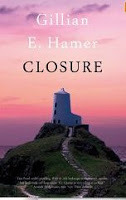 Probably Closure, because it’s what I class as my first proper completed novel – although it has gone through numerous rewrites. It’s part of the cross-genre crime books that I love to write – crime with a hint of paranormal. It looks at the topic of reincarnation and how different people have opposing views about such things.
Probably Closure, because it’s what I class as my first proper completed novel – although it has gone through numerous rewrites. It’s part of the cross-genre crime books that I love to write – crime with a hint of paranormal. It looks at the topic of reincarnation and how different people have opposing views about such things.I found the whole subject fascinating; much of the research I included in the book really opened my eyes to the topic. And I still remember where I got the original idea – from a television programme where a young boy was regressed and then taken back to the remote Shetland Island where he knew he’d lived previously. I knew there was a story there that I wanted to retell in my own way and I loved creating the characters. Yes, it’s probably the book that has made me the most proud to date.
Where do you get your ideas?Closure – I’ve just covered.
With The Charterit was a fascination with shipwrecks which I’ve always had – I used to collect anything to do with the Titanic as a child. Having a house on Anglesey and friends who come from the area, I’ve grown up with stories about the shipwrecks around the coast and spent hours treasure hunting on the beaches. I remember visiting Llanallgo Church as a child – where most of the Royal Charter victims are buried – and getting really drawn into the story. I researched it and then tried to think of ways of bringing it to life in a modern day crime story.
With Complicit it was the discovery of the Staffordshire hoard – a treasure hoard of Saxon gold – found near my parent’s home that gave me the idea. I went to see it at Birmingham Museum, then went to a lecture given by the archaeologists, and decided I wanted to write about a treasure hunt in the modern day but also cover how and why the treasure ended up where it did - as that seems to this day to be something we will never know about the Staffordshire hoard. Anglesey is famous for its Roman invasion and its strong Druidic influences – so that seemed a perfect combination!
Who is your favourite character from your own work and why?Probably Helen West – the mother of the reincarnated child who suffers from the nightmares and traumas in Closure. She’s a strong woman, grieving for the loss of her husband, and having to cope with seeing her child suffer. And yet, she is strong enough to stand up to the doctors who doubt him – and has strength in those convictions right up to the point of travelling back to the place her son remembered from his previous life. She has balls – and I like a woman with balls!
Which character from the work of others do you wish you’d invented and why?Goodness me, so many! I’d have to choose one obvious one as a crime writer – Miss Marple. I love how Christie broke moulds by choosing a female – and an elderly female at that. I love how she was quietly intelligent, letting the big, strong male detectives think they were solving the cases – whereas behind the scenes she was steering them in the right direction. She had a brilliant knack of knowing people, understanding what made them tick, and yet she carried it off with a brilliant air of humility. And I loved the twinkle in her eye!
If you could have been someone from history involved in crime (good or bad) who would that be and why?That’s a really interesting question I’ve never considered before. I’d want to be a goodie, so on the side of the police, I don’t think in real life I’d be much good as a baddie. So, a really interesting crime that was never solved maybe. Jack the Ripper? I could be the Victorian female detective who came along with her new forensic tricks and solved the crime! There … could be a story in there.
What are you working on now?I’m actually on a mini-break. I’ve been writing solidly on rewrites for the past twelve months. Complicitis out in a couple of weeks, so I’m going to give myself the summer to enjoy reading and start thinking of a few new storylines. I’ll see how long I last – I may well be engrossed in a new full length novel in a month’s time if something takes my interest!
The Charter & Closure are available as paperback or ebook on Amazon. Complicit available soon.
Biography:Born in the industrial Midlands, Gillian's heart has always yearned for the wilds of North Wales and the pull of the ocean. A company director for twenty years, she has written obsessively for over a decade, predominantly in the crime genre. She has completed six full length novels and numerous short stories. After completing a creative writing course, she decided to take her writing to the next level and sought representation. She is a columnist for Words with Jam literary magazine, a regular theatre goer and avid reader across genres.
WEBSITE : www.gillianhamer.comBLOG : http://gillianhamer.wordpress.com TWITTER : @gillyhamerFACEBOOK : http://www.facebook.com/#!/pages/Gillian-E-Hamer/279383198798678
Published on May 29, 2013 23:15
May 24, 2013
Ten facts about ... Ruth Dugdall
When did you first realise you wanted to be a writer?I met with an old school friend recently, having not seen her for 25 years, and she said that on during our first year at secondary school we had each been asked what we wanted to be when we grew up and I’d said “a writer”. So I suppose the answer is 12 years old!
How long does it take you to write a book?
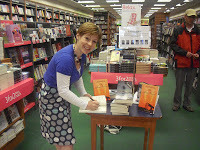 Years. From starting with the first draft to eventual publication has been five years for each of my published novels. And I have been working on my current novel since 2009…But I don’t work on one novel exclusively, so that time will be divided between at least two on-going projects.
Years. From starting with the first draft to eventual publication has been five years for each of my published novels. And I have been working on my current novel since 2009…But I don’t work on one novel exclusively, so that time will be divided between at least two on-going projects.What is your work schedule like when you're writing?At the beginning, I can be prolific, and set myself a goal of 1000 words a day. But that just gets the first draft done and the journey from that to the finished novel is long (see above!) so I will then go over the draft repeatedly, working in themes or sub-plots or adding in research.
How many crime novels have you written?Three have been published, but I have written a further two, and two others are in first draft stage.
Which is your favourite and why?
 Difficult question. The James Version was my first novel so, like a first child, I made mistakes but I also learned a great deal. The Woman Before Me is my most successful novel, and it is also the most emotional (it concerns motherhood and the death of children, and the first draft was written when I was on maternity leave) and can still make me cry. But I think my best novel is The Sacrificial Man. I like the coolness of Alice, and I feel my writing is strongest with cool and detached characters. Where do you get your ideas?From life: cases I’ve worked; stories I’ve read in the newspaper. I was a probation officer and continue to work with Criminal Justice so I come across troubling and bizarre stories often. The ones I write about are the ones that I can’t stop thinking about: why did that happen? How does someone justify that?
Difficult question. The James Version was my first novel so, like a first child, I made mistakes but I also learned a great deal. The Woman Before Me is my most successful novel, and it is also the most emotional (it concerns motherhood and the death of children, and the first draft was written when I was on maternity leave) and can still make me cry. But I think my best novel is The Sacrificial Man. I like the coolness of Alice, and I feel my writing is strongest with cool and detached characters. Where do you get your ideas?From life: cases I’ve worked; stories I’ve read in the newspaper. I was a probation officer and continue to work with Criminal Justice so I come across troubling and bizarre stories often. The ones I write about are the ones that I can’t stop thinking about: why did that happen? How does someone justify that?Who is your favourite character from your own work and why?Alice, my cannibal killer from Lavenham. Because she doesn’t realise she’s the protagonist in a crime novel; she thinks she’s a romantic heroine in a love story.
Which character from the work of others do you wish you’d invented and why?Camille Preaker from Gillian Flynn’s Sharp Edges is a brilliant invention. She is a self-harmer but she writes words on her body.
If you could have been someone from history involved in crime (good or bad) who would that be and why?Elizabeth Fry, prison reformer. I’m attracted to the idea of making a difference.
What are you working on now?My Sister And Other Liars. It’s a revenge tale, and a coming of age story, about a young girl who has decided to kill the man who attacked her sister.
Twitter: ruthdugdallRuthdugdall.comFacebook: ruthdugdallauthor
THE JAMES VERSIONTHE WOMAN BEFORE METHE SACRIFICIAL MAN
Published on May 24, 2013 00:56
May 16, 2013
Ten facts about … David W Robinson
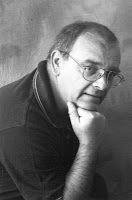 Ten facts about … David W Robinson
Ten facts about … David W RobinsonWhen did you first realise you wanted to be a writer?I was about 12 years old, and I’d just read ‘And Then There Were None’ by Agatha Christie, and I thought, hmm, I can do that. I began writing short stories soon after, but naturally, I never did anything with them. I only began to take it seriously in my 30s and I was over 50 before I published my first novel.
How long does it take you to write a book?It depends on the book. I write full time now, and I can turn out a STAC Mystery (50-80,000 words) in a month, but longer, more detailed work, such as The Handshaker, can take anything up to two years.
What is your work schedule like when you're writing?Manic. I’m usually up by six, when I spend an hour checking overnight emails, chart positions and sales estimates. I write a blog post if I have one in mind, and then I begin work usually by eight in the morning. I work until 1 p.m. with only the occasional breaks to walk the dog, then take an hour off for lunch. I’m back at it just after two and I usually finish around seven in the evening, again with odd breaks to walk the dog.
How many crime novels have you written?Hundreds LOL. Mercifully, not all of them have seen the light of day.
As of this moment, I have seven STAC Mysteries published, and the eighth is due next month. I also have one dark thriller, The Handshaker, and the sequel to that is with my publisher. By the time they’re released, it’ll be ten published works.
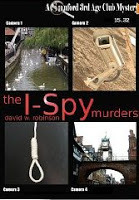 Which is your favourite and why?The I-Spy Murders, which is STAC Mystery #2. I hate TV, and I especially hate shows like Big Brother, so it seemed to me to be the perfect setting for a murder. It would be practically impossible with the cameras covering every action, so I had to alter the TV company’s methodology slightly, and I was really pleased with the end result.
Which is your favourite and why?The I-Spy Murders, which is STAC Mystery #2. I hate TV, and I especially hate shows like Big Brother, so it seemed to me to be the perfect setting for a murder. It would be practically impossible with the cameras covering every action, so I had to alter the TV company’s methodology slightly, and I was really pleased with the end result.Where do you get your ideas?They’re all around me. Tiny, ordinary events which happen all the time. When something catches my attention, I ask myself, “What if…”
For example: There is a huge supermarket nearby, and I was having breakfast there when I noticed a woman making notes by the DVD displays. She wore an identity badge on a cord around her neck. Nothing strange about that. She was obviously a member of staff.
But what if she wasn’t? What if she was a spy for another supermarket, or what if she was from the DVD producers looking for pirate copies? And what if she turned up murdered later in the day?
Change the giant, nationally known supermarket to a privately owned minimarket, throw in a lover, several red herrings, and you have a murder mystery. All while I’m taking tea and toast in a supermarket café.
Who is your favourite character from your own work and why?Brenda Jump from the STAC Mysteries. Brenda is a widow and her husband’s early death brought home to her the realisation that life is not forever, in the same way that my younger brother’s early and unexpected death (he was 54) hit me. Brenda is hell bent on enjoying herself. As long as she’s not hurting anyone else, she’ll have a damn good time.
Which character from the work of others do you wish you’d invented and why?In crime fiction or any genre? If any genre, it would be Tom Sharpe’s masterly creation, Henry Wilt. He doesn’t make things happen, they just happen to him.
If, on the other hand, we’re talking crime then it would be Hercule Poirot. This annoying little man never jumps to arbitrary conclusions. He notices everything, and formulates his theories to take account of that everything.
If you could have been someone from history involved in crime (good or bad) who would that be and why?A difficult question, but on the whole I think Detective Chief Superintendent Peter Topping of the Greater Manchester Police. He was the officer who reopened the Moors Murders inquiry in 1985, and despite some criticism, as a result of his work, Hindley admitted her part in all five murders. They also recovered the body of Pauline Reade.
What are you working on now?STAC Mystery 9, which is set in your part of the world, Torremolinos. My wife and I were there in January this year, and I thought it was time Joe had a suspected heart attack and a holiday. Why should I leave him enjoying the sunshine on the Costa del Sol when he could be investigating a murder (or two)?
I’m also working on two new series. Later this year will see Madeleine Chester, a nosy genealogist, make her debut, and the other series will be an attempt to revive British farce with a series of crime based novels featuring Dennis and Danny, a couple of idiots, who win through more by luck than judgement.
Finally, there are plans for a third Croft/Millie novel to follow The Handshaker and its sequel, but I must admit, I haven’t done much work on it.
***
David Robinson is 63 years young. A former adult education teacher, now a full time novelist, he abides by the principle that if you haven’t grown up by the time you’re 50, you don’t have to. His series of light-hearted whodunits, the STAC Mysteries, have remained in the Amazon UK Kindle, British Detectives chart for the last six months. He lives on the outskirts of Manchester with his wife and a crazy Jack Russell terrier name Joe.
Find David at:Amazon: http://www.amazon.co.uk/-/e/B004M204BCWebsite/blog: http://www.dwrob.com/Facebook: https://www.facebook.com/davidrobinsonwriterTwitter: @DW96Goodreads: http://www.goodreads.com/dwrobCrooked Cat Books: http://www.crookedcatbooks.com/index.php?route=product/manufacturer/product&manufacturer_id=11
Published by Crooked Cat Books
The STAC MysteriesThe Filey ConnectionThe I-Spy MurdersA Halloween HomicideA Murder for ChristmasMurder at the Murder Mystery WeekendMy Deadly ValentineThe Chocolate Egg Murders
Other WorksThe HandshakerVoices
Coming soonCosta del Murder (STAC Mysteries)The Deep Secret (sequel to The Handshaker)
Published on May 16, 2013 01:17



